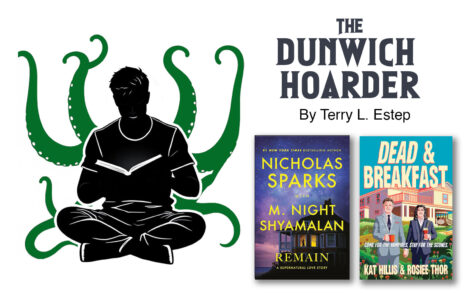Reporter’s Notebook: To your health!

(Reporter's Notebook by Steven Allen Adams - Photo Illustration - MetroCreativeConnection)
Last week, I covered the final two days of permanent injunction hearings to block a June directive from the West Virginia Board of Education to county boards of education to continue to enforce the state’s compulsory vaccine law and not accept religious exemptions approved by the Department of Health and made possible by Gov. Patrick Morrisey’s January executive order.
I’m not going to rehash all of the particulars. You can read my coverage of both days. But I wanted to use my column to focus on last Thursday morning’s testimony by Dr. Mark McDaniel, the acting state health officer and commissioner of the Bureau of Public Health within the Department of Health.
Department of Health Secretary Dr. Arvin Singh announced the appointment of McDaniel on Aug. 21, with McDaniel starting his new role on Aug. 25. He is a retired colonel in the West Virginia Air National Guard, wrapping his career as state air surgeon.
I get that the man has only been the acting state health officer for just over six weeks, but I didn’t get the impression from his testimony last week that he is truly acting as the state’s health officer.
For one thing, McDaniel couldn’t keep his title straight, referring to himself twice as the state’s chief medical officer. Also, he appears to be completely unaware of the religious vaccine exemption program that his own office administers.
“I don’t have any purview over (religious exemptions),” McDaniel said.
That statement simply makes no sense. It would be one thing for McDaniel to say that someone else handles religious exemption requests in his office. But to say he has no purview?
I had to go back to Morrisey’s January executive order to make sure, but yes, the order directs the “Commissioner of the Bureau for Public Health and State Health Officer” to establish a process for religious vaccine exemptions. Now, I know McDaniel wasn’t the acting state health officer in January and therefore was not the one who established the process. But religious exemptions fall squarely on his office.
Morrisey’s executive order also requires the Bureau for Public Health/state health office to report to the Governor’s Office the number of people who have requested religious exemptions. However, when asked what the current number was, McDaniel did not know. Did he think he wouldn’t be asked?
I am also a bit concerned about his private sector jobs which he appears to still be doing while serving as acting state health officer. McDaniel is a regional medical director for LabCorp Inc. During his testimony, McDaniel said his job responsibilities in that role take up two hours per year.
Two hours per year? That’s good work if you can get it.
McDaniel is also the regional medical supervisor for AFC Urgent Care Centers in North Carolina and Virginia, which he dedicates 15 minutes per month according to his testimony. It would appear, at least initially, that he is giving his role in the Bureau for Public Health the same dedication.
***
As a one-man band of a news reporter, I often have to make decisions about news judgement. Because while I’m great at multitasking, I still can’t split myself into multiple people.
That’s what can sometimes make covering legislative interim meetings a challenge. When you have multiple meetings in one day, you have to pick and choose what to cover based on sometimes vague committee agendas.
The fact that the state Senate records and archives its videos for joint committees is helpful, but I also prefer to go to committee meetings in person when possible. But sometimes, I have to have my desktop computer running one committee meeting and my laptop running another one, with a different earbud in each ear.
I, of course, want you to read my stories. But that’s also why I encourage people to read everything from my fellow statehouse reporting colleagues. Because sometimes they will cover a meeting I didn’t cover, and sometimes they may focus on one thing in a meeting that I didn’t focus on.
***
Those of us in your local media – newspapers, radio, TV, and the small-but-growing online news organizations – put in more hours than you can know. Sometimes that can involve waking up early to cover a car accident on an interstate, then later covering a two-hour city council meeting and trying to rush to write the story to make the deadline so the paper can be printed.
Being a TV and radio reporter can be hard too, not just trying to get people on camera or on microphone, but then having to jump on computers and cut audio and put together video packages which take forever to render. And if your computer crashes, that could mean not having anything for the 4 p.m., 5 p.m., 6 p.m., 7 p.m., or 11 p.m. newscasts. Don’t forget, the morning show needs you to cut a whole new package.
That’s just the reporters. TV and radio producers have harder jobs still. Producing a TV news program is almost akin to computer programming, requiring complicated coding to ensure video packages play and on-screen graphics display when they’re supposed to. And if breaking news happens, you have to throw out all that hard work and hours of time to start over again.
There might be more people with college degrees in the journalism profession now, but it is still at its heart a blue-collar job. If you don’t believe me, then go work a shift on a newspaper printing press. I have, and I used to come home every night covered in ink and dirty fingernails from changing out plates and catching the papers as they came off the press.
The people who bring you the news each day and week are some of the hardest working people you’ll meet. The hours are long and sometimes the pay is low, but the job gets done because of a love and a commitment my colleagues have in serving the local communities. Our stories make you smile, they make you cry, they make you angry, and they also make you think.
We’re not your enemies; we’re your neighbors and friends.
***
If you’re reading this, the West Virginia Press Association annual convention will have just taken place at the University of Charleston on Saturday. Every year, newspapers from across the state submit stories to be judged by journalism colleagues in other states.
I am constantly told that newspapers are dying. They might be in other parts of the country, but West Virginia still has a strong newspaper industry.
Steven Allen Adams can be reached at sadams@newsandsentinel.com.






